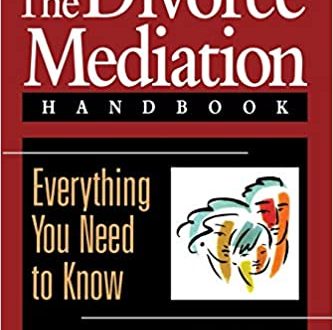The Benefits of a Litigated Divorce Mediation
Divorce mediation is a constructive, non-adversarial alternative to the often adversarial practice of family courts, where attorneys are the ones seeking to settle disputes. Divorce mediation is a successful and often mandatory alternative to the more adversarial practice of family courts, where attorneys are the ones seeking to win and have their awards upheld. Divorce mediation provides divorcing couples the opportunity to plan their future together, rationally, in an environment of mutual respect and trust. By reducing the need for attorneys to decide the outcome of the divorce case, divorce mediation can benefit both parties and children, providing a peaceful, affordable solution that the court system may not be able to achieve.
Many times after a divorce, couples will try to work things out between themselves without the help of an attorney. However, attorneys are often a hindrance, preventing such negotiations from occurring and ensuring that children are not exposed to their volatile parents during the litigation process. In many cases, couples choose to work on a “buy-out” agreement in which the spouse offering the less-than-optimal exit payout offers the spouse a much higher settlement offer in return for surrendering the house, property, and other belongings. Although such buyouts are frequently successful, they do occur rarely and usually end up with a trial. For this reason, divorce mediation is often preferable over divorce court proceedings, in which case attorneys may be seen as unduly obstructing the process.
During divorce mediation, the parties sit with an experienced neutral third-party individual, usually a former practicing lawyer, to facilitate the discussion. The mediator facilitates dialogue between the two sides by maintaining an unbiased standpoint, offering neutral advice to both sides, and listening intently to each side and each spouse’s responses. Because an impartial party administers the mediation process, the process often flows naturally without the lengthy, drawn-out court proceedings commonly witnessed in divorce court rooms. Through years of practice, lawyers who specialize in negotiating divorce settlements are proficient at interpreting the signals displayed by their clients-including body language, tone of voice, intonation, etc.-and use these cues to help their clients negotiate better results from the negotiations.
Once one spouse agrees to a settlement amount, the negotiation then shifts to determining which issues will be settled and how they will be settled. Often, a demarcation of responsibilities is reached, with one spouse responsible for specific areas of the children’s care (such as visitation and child support) while the other spouse pays similar obligations to care for the children as a family. A common issue that is resolved in divorce mediation is how each spouse will fulfill their obligations regarding domestic violence. Numerous studies have found that the majority of marital problems can be successfully resolved through the implementation of effective strategies for domestic violence, such as domestic abuse education, and the understanding of what types of behavior constitute domestic violence.
During divorce mediation, it is often beneficial if both parents participate. Through dialogue, both parties are able to express their needs and concerns, which may help them to better understand each other and develop a plan for their future. In some cases, the participants in the divorce mediation may also become interested in learning about child custody laws in their state so that they may initiate proceedings to establish their own child custody arrangements. The more knowledgeable they are about their state’s laws, the more likely they will be to seek guidance on their own legal status. It is also common for participants in divorce mediation to form joint custody arrangements or joint parenting plans with the other parent or the custodian of the children.
Because mediators serve as impartial third-party individuals who facilitate communication between divorcing couples, it is very unlikely that the mediator will try to help one party succeed more than the other. This is because each spouse is sure to have their own needs, desires and concerns, regardless of whether these may conflict with the needs of the other parent. However, the vast majority of divorce mediation situations do end in a satisfactory settlement, providing that the divorcing couple is willing to communicate and cooperate with the other parent or guardian. Even if there are some areas that the mediator would like to negotiate, the divorce cases are usually settled amicably, with each party seeking to settle things amicably, with the mediator retaining the option of using traditional court procedures if required.
If you are considering a do-it-yourself divorce and/or do-it-yourself attorney, it is not advisable to proceed with a do-it-yourself mediation process. Attorneys who are skilled in divorce mediation are often very experienced at ensuring that all parties receive an equal opportunity to present their case. Furthermore, attorneys who use do-it-yourself mediation practices do not have the experience, knowledge, or training to ensure that the proceedings are fair and fully-protected.
In contrast, both parties can benefit from a well-prepared, effective litigator who is familiar with do-it-yourself divorce mediation and other litigation strategies. Many couples enter into this type of settlement process with an open mind and a willingness to explore possible avenues prior to making a final decision. Unfortunately, some divorcing couples do not take advantage of the many benefits that can be found in a good divorce mediation session. It is unfortunate that some people delay a settlement long enough to hire an unprofessional attorney who practices do-it-yourself divorce mediation.



